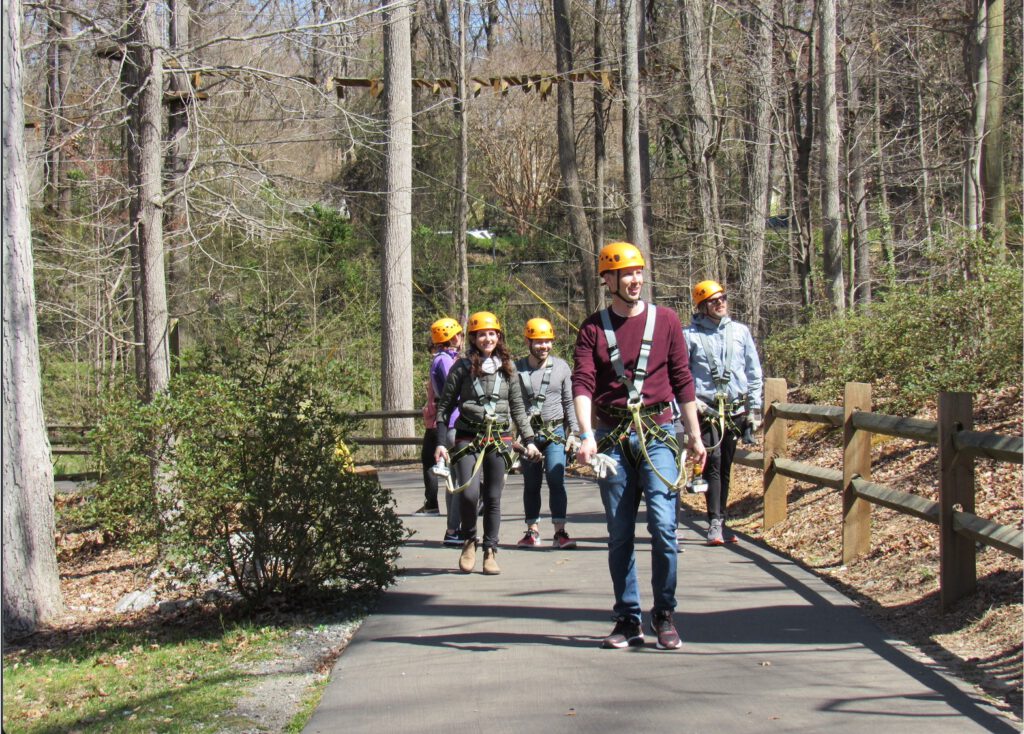Communicating the value of camp counselors’ work
For too long, camp counselors were seen as a fun, temporary job leaning more towards carefree adolescence than the “real” working world. Glorified babysitters, if you will.
For that reason, for Jewish young adults searching for a summer job that will look good on their professional resume, working as a camp counselor can be a difficult sell compared with more so-called “professional” opportunities like working in a business or office in their field.
But Abby Mintz, Program Director at M²’s Center for Values in Action, wants the Jewish community to radically shift the way it looks at camp counselors, recognizing the vast professional skill set it requires to be a successful counselor.
“The biggest misconception is that it’s not a professional job because what’s visible about the job is the eating s’mores and wearing tie-dye,” said Mintz. Mintz started her career in the corporate world, and she found that many of the same skills that corporate recruiters look for are also present in camp counselors. In her corporate work, Mintz used the Lominger Competencies model. She suggests that this model can be applied for the skills that camp counselors need: learning on the fly, managerial courage, presentation skills, and decision quality.
There are many other skills and attributes that camp counselors must share, including approachability, which helps ensure campers’ psychological safety; creativity to solve problems and meaningfully engage children in growth-fostering activities; integrity because counselors deal with sensitive information about their campers and co-counselors; and more.
Mintz wants to change the conversation, so that counselor jobs are adequately recognized as the powerful professional growth opportunities that they truly are. “Being a camp counselor is like a crash course in human-centered design, where it is your job to deeply listen and understand the wants and needs and desires of your audience, and then curate experiences that meet them where they’re at and support their growth and development,” said Mintz. “This is holy and sacred and really critical work.”
Roles that teach collaboration and listening skills
“Walk into any art center where campers are working on an art project with their counselor, and there are two very different ways — both of them accurate — to look at what’s happening,” Mintz explained, citing the work of camp educator Michael Brandwein. “One could be that they’re using popsicle sticks to make a picture frame, and maybe that’s actually what they’re doing. The other way to talk about what they’re doing is that they are developing collaboration skills, taking the time to listen to what everybody wants the design of their project to look like, and finding ways to incorporate everybody’s ideas.”
“I want to push us, as supporters of camps, to think about what’s underneath the surface,” said Mintz. Perhaps eating s’mores isn’t a silly camp thing, but an activity that supports the value of honoring traditions,” she said. “Maybe singing “Kumbaya” is a form of self-care for campers – and the camp educators themselves, and making matching tie-dye shirts is a way to experiment with the value of creating a shared identity within the community.”
Getting the entire Jewish community to shift perspective
When it comes to camp counselors, the Jewish communal world needs to recognize and acknowledge how crucial these roles are in our community at large. Mintz is clear that it is not the responsibility of counselors themselves to push for this shift in perspectives. “I want to shift the responsibility to be on the shoulders of people who support camp counselors, to other Jewish communal professionals and adults who care about the development of the people in their life,” she said. Campers often worship their counselors, even copying their clothing style or musical preferences, said Mintz. It’s a unique relationship that isn’t replicated in other Jewish frameworks — one that deserves to be celebrated and respected by the entire Jewish community, even those outside the camp world.
“I would push Jewish communal professionals to think about the level of responsibility that they have in helping camps and camp counselors articulate the real skills that are required of camp counselors to help raise our kids,” said Mintz.
Now is the perfect time for change
Camps across the country are experiencing a severe staffing crisis, like many industries right now. “If there’s a movement to better articulate the professional skills that they hold, we would be able to chip away at this real staffing crisis, by treating it as a desirable job that is so obviously transferable onto a resume or into an interview,” said Mintz.
Part of that change comes from changing the conversation about what happens at camp, from surface-level activities like swimming and archery and bonfire making, to the deeper skills that prepare both campers and counselors to excel in life. Now is an especially good time to change the conversation in ways that enable new growth and development for our communities.
“Right now, in this moment, when the world is just broken open, there are countless opportunities for us, as Jewish communities, to heal and move forward and grow,” said Mintz. “It’s a really awesome, opportune moment for us to be thinking about the impact of our behavior and our choices, how our words are supportive or not, and how we can take responsibility for this community of incredibly talented professionals who are emerging leaders in the Jewish world.”
Abby Mintz is an alumna of M²’s Camp Educators Cohort, which helped her and other camp leaders learn how to utilize M²’s unique, value-driven approach to Jewish education and apply it to the camp setting. After completing the Camp Educators Cohort and serving as the community coordinator for the Chicago Educators Cohort, Mintz recently became the Program Director for Values in Action, an M² initiative that equips educators with training and resources to navigate contemporary challenges through a Jewish values lens.
